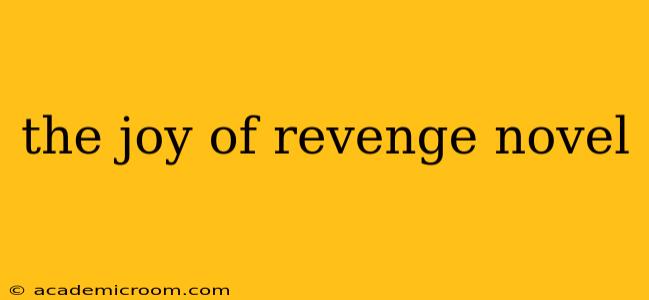Revenge. It's a potent emotion, a driving force in countless narratives, and a central theme explored with varying degrees of nuance and complexity in the "joy of revenge" novel. This genre, while not formally categorized as such, encompasses stories where the pursuit and execution of revenge form a significant plot arc, often providing the protagonist with a sense of catharsis and satisfaction. But is the joy of revenge truly a justifiable emotion, and what are the implications of its exploration in literature?
This article delves into the compelling nature of revenge narratives, examining the psychological motivations behind the desire for retribution, the ethical dilemmas they present, and the literary techniques employed to depict the emotional and moral complexities of seeking vengeance. We'll explore several aspects of the "joy of revenge" novel, including the satisfaction it provides readers, the potential for catharsis, and the inherent dangers of such a pursuit.
Why Do We Enjoy Revenge Stories?
Many readers find themselves captivated by narratives of revenge. This fascination stems from several interconnected factors:
-
Justice: We often crave justice, particularly when we witness wrongdoing go unpunished. Revenge stories offer a vicarious fulfillment of this desire, providing a sense of closure when the perpetrator is brought to account. The narrative arc satisfies a primal need for balance and fairness.
-
Power Dynamics: Revenge narratives often involve a power imbalance, with the protagonist initially powerless against a stronger antagonist. Witnessing the protagonist overcome this imbalance and exact their revenge can be deeply satisfying, offering a sense of empowerment to the reader.
-
Emotional Catharsis: Reading about a character meticulously planning and executing revenge can offer a cathartic experience for the reader. We can vicariously experience the emotions of triumph and vindication without facing the real-world consequences.
-
Moral Ambiguity: The best revenge stories don't shy away from exploring the moral gray areas inherent in seeking vengeance. They challenge the reader to consider the ethical implications of revenge, blurring the lines between justice and cruelty.
What are the Dangers of Revenge?
While the pursuit of revenge can be compelling in fiction, it also carries significant dangers:
-
Escalation: The cycle of revenge rarely ends with a single act. Retribution often leads to further acts of violence, creating a vicious cycle with devastating consequences for all involved.
-
Moral Corruption: The act of revenge can corrupt the avenger, transforming them into something they never intended to be. The focus on inflicting pain can erode the individual's moral compass.
-
Self-Destruction: The obsession with revenge can be all-consuming, leading the protagonist to neglect other aspects of their life and ultimately destroy themselves in the process.
-
Unintended Consequences: Revenge rarely unfolds as planned. Unforeseen consequences and collateral damage are often the bitter fruits of a vengeful pursuit.
Is Revenge Ever Justified?
This is a question that has plagued philosophers and storytellers for centuries. While many revenge narratives depict justifiable revenge, often stemming from acts of profound injustice or violation, the line between justified retribution and excessive cruelty remains blurry. The effectiveness and morality of revenge are frequently debated within the narrative itself, challenging the reader to form their own conclusions.
What are the Key Elements of a Successful Revenge Novel?
A compelling "joy of revenge" novel typically incorporates several key elements:
-
A compelling protagonist: The reader needs to empathize with the protagonist's plight and understand their motivations for seeking revenge.
-
A believable antagonist: A truly effective antagonist is one that is both formidable and deserving of retribution.
-
A meticulously plotted revenge: The plan for revenge must be well-crafted and suspenseful, keeping the reader engaged and on the edge of their seat.
-
Exploration of moral ambiguity: The best revenge novels don't offer simple answers but grapple with the complexities of justice and morality.
-
Satisfying conclusion (but not necessarily a happy ending): While the protagonist may achieve their goal, the novel should acknowledge the cost of revenge and the lasting consequences.
How Does the Genre Differ from Other Thriller Subgenres?
While sharing some elements with thrillers, the "joy of revenge" novel places a greater emphasis on the emotional journey of the protagonist and the exploration of the ethical implications of their actions. Other thrillers may prioritize suspense and plot twists above the character's internal conflict, while revenge stories explore the psychology of retribution in greater depth.
In conclusion, the "joy of revenge" novel offers a fascinating exploration of human nature, delving into the complexities of justice, morality, and the seductive allure of retribution. While the pursuit of revenge may offer a temporary sense of satisfaction, these narratives often caution against the potential dangers and destructive consequences of this powerful emotion. The best stories in this unofficial genre offer a nuanced and compelling examination of this timeless conflict, leaving the reader to ponder the true meaning of justice and the price of vengeance.
